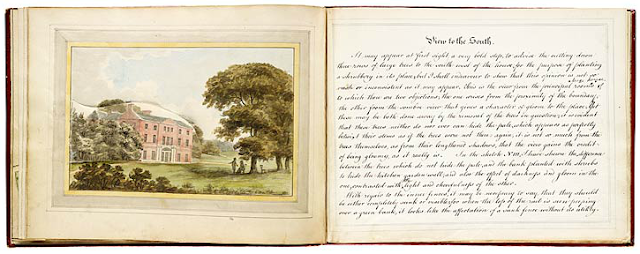"I have lived", said Mr. Humphrey Repton in 1816, "to see many of my plans beautifully realised, but many more cruelly marred, sometimes by false economy, sometimes by injudicious extravagance. I have also lived to reach that period where the improvement of houses and gardens is more delightful to me than that of parks and forests, landscapes, or distant prospects."
Repton died just two years later after this looking-back, in 1818, having spent his last years in a 'Bath chair', (we would now call it a type of wheelchair) after injuries sustained in a carriage accident. His confinement prompted him to pen what are to my knowledge the earliest guidelines for accessible gardening:
"...my own infirmities have lately taught me how the solace of garden scenery and garden delights may be extended a little further, when the power of walking fails...The loss of locomotion may be supplied by the Bath chair with wheels; but, if these are to grind along a gravel-walk, the shaking and rattling soon become intolerable to an invalid, and, therefore, glades of fine mown turf, or broad verges of grass, should be provided, as means of avoiding the gravel; and such grass communications may be so made, as to increase the interest of the scenery, by varying its features; for, although a gravel-walk must have its two sides parallel, or nearly so, yet a grass-walk should never be of any uniform breadth; it should rather vary in its outline, sometimes flowing among shrubs, sometimes under trees, as in the chequered shade of an open grove; and sometimes in one ample green mall, or terrace, commanding a distant prospect, a pleasing landscape, or even the curious though confined combination of rare exotic trees, within the sheltered boundary of the pleasure-ground.
All these may be enjoyed by the cripple, with as much, and perhaps more, satisfaction from his wheeling-chair,or from a garden-seat, than by those who can encounter the fields of the farm, or the haunts of the forest; caring very little for the luxuries of a garden, as felt under the painful pressure of infirmity. These remarks are equally applicable to the fruit-garden, the flower-garden, or the pleasure-ground: they should all be accessible to a garden-chair on wheels, and all should he provided with ample grass-walks, to avoid the offensive noise of gravel."
[Quotes are from The landscape gardening and landscape architecture of the late Humphrey Repton, edited by J.C. Loudon in 1840, and available online at google books. The images accompanying this post are from the Morgan Library's Red Books for Fernery Hall and Hatchlands.]



0 comments:
Post a Comment